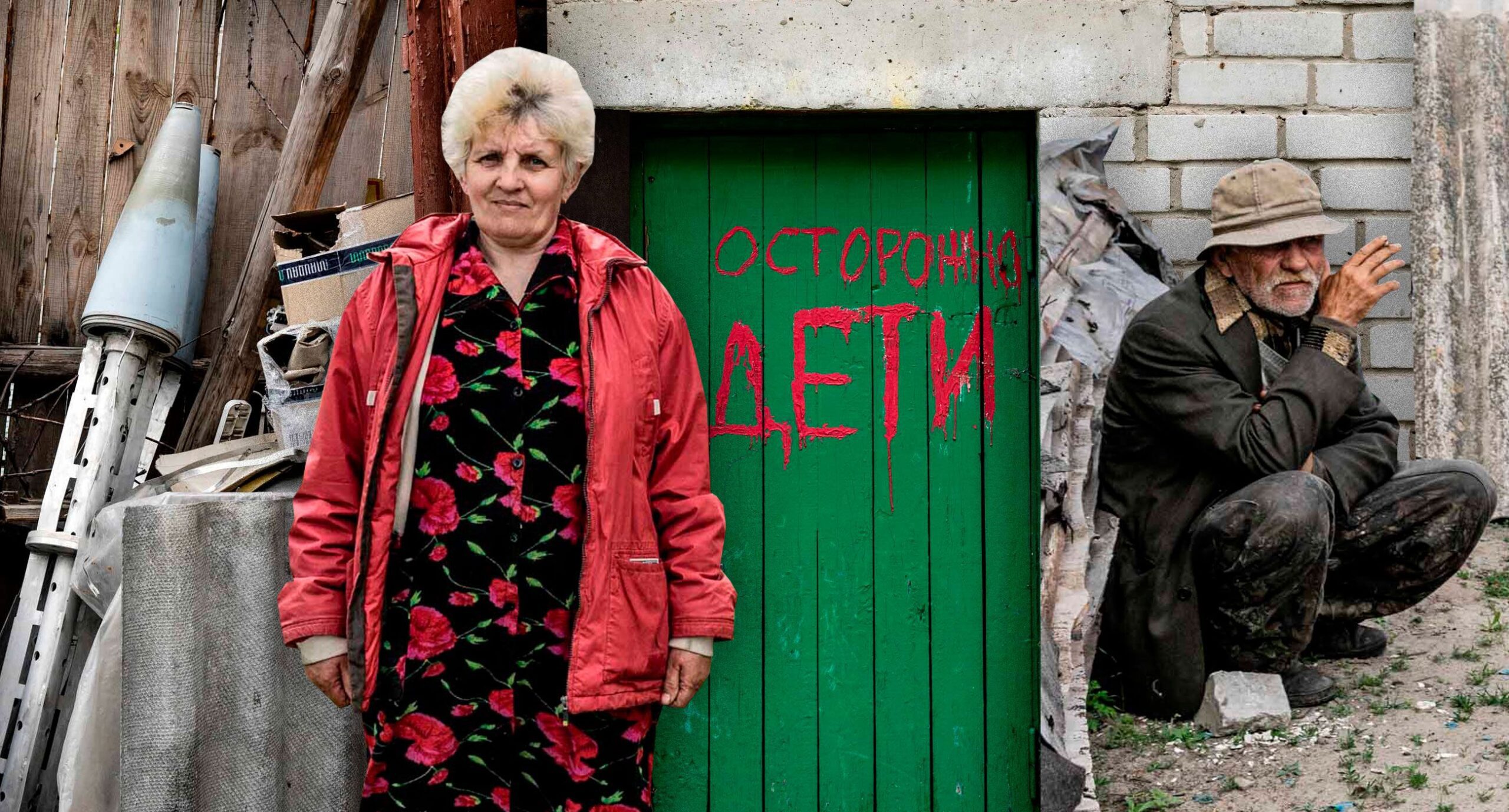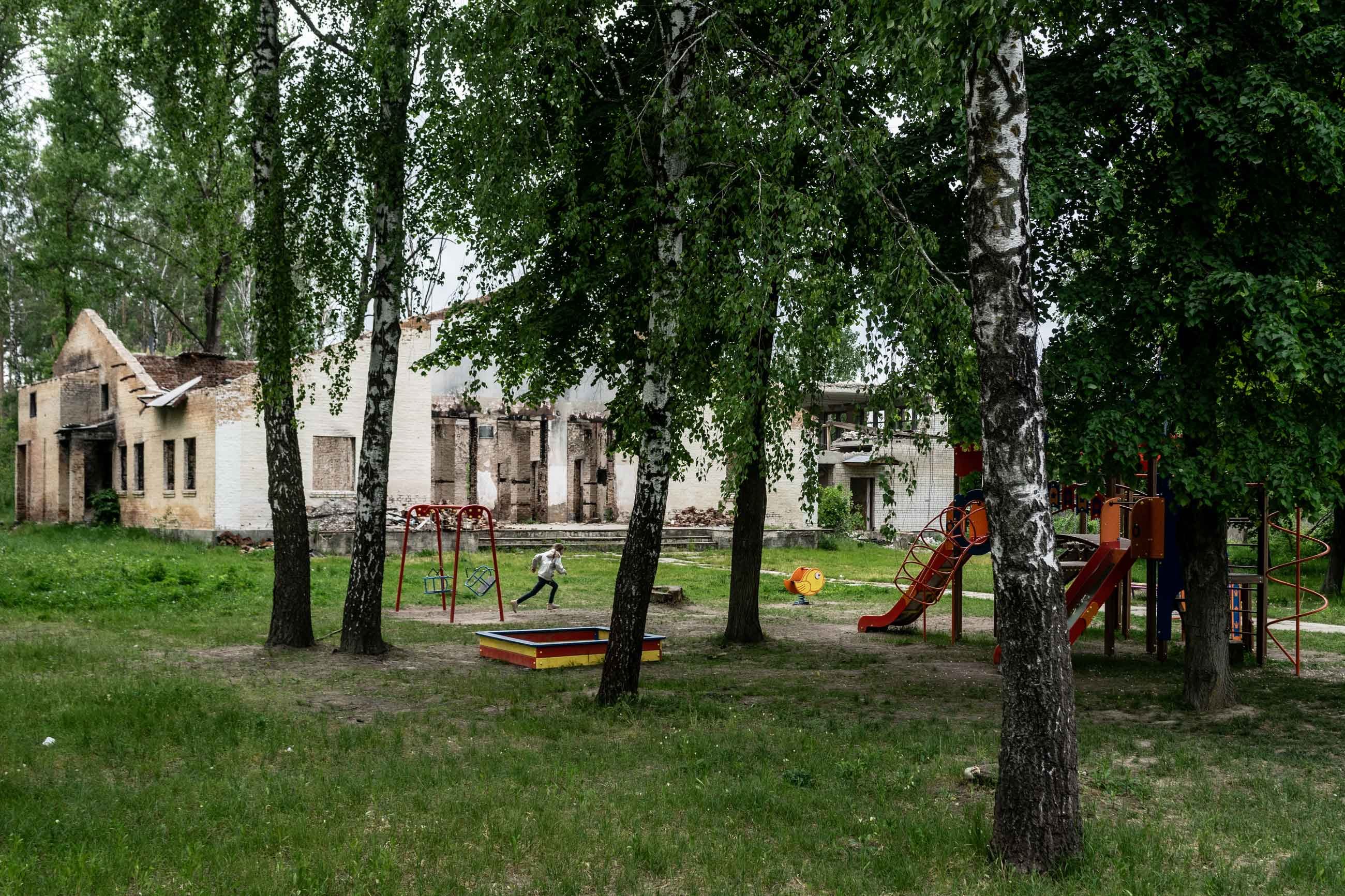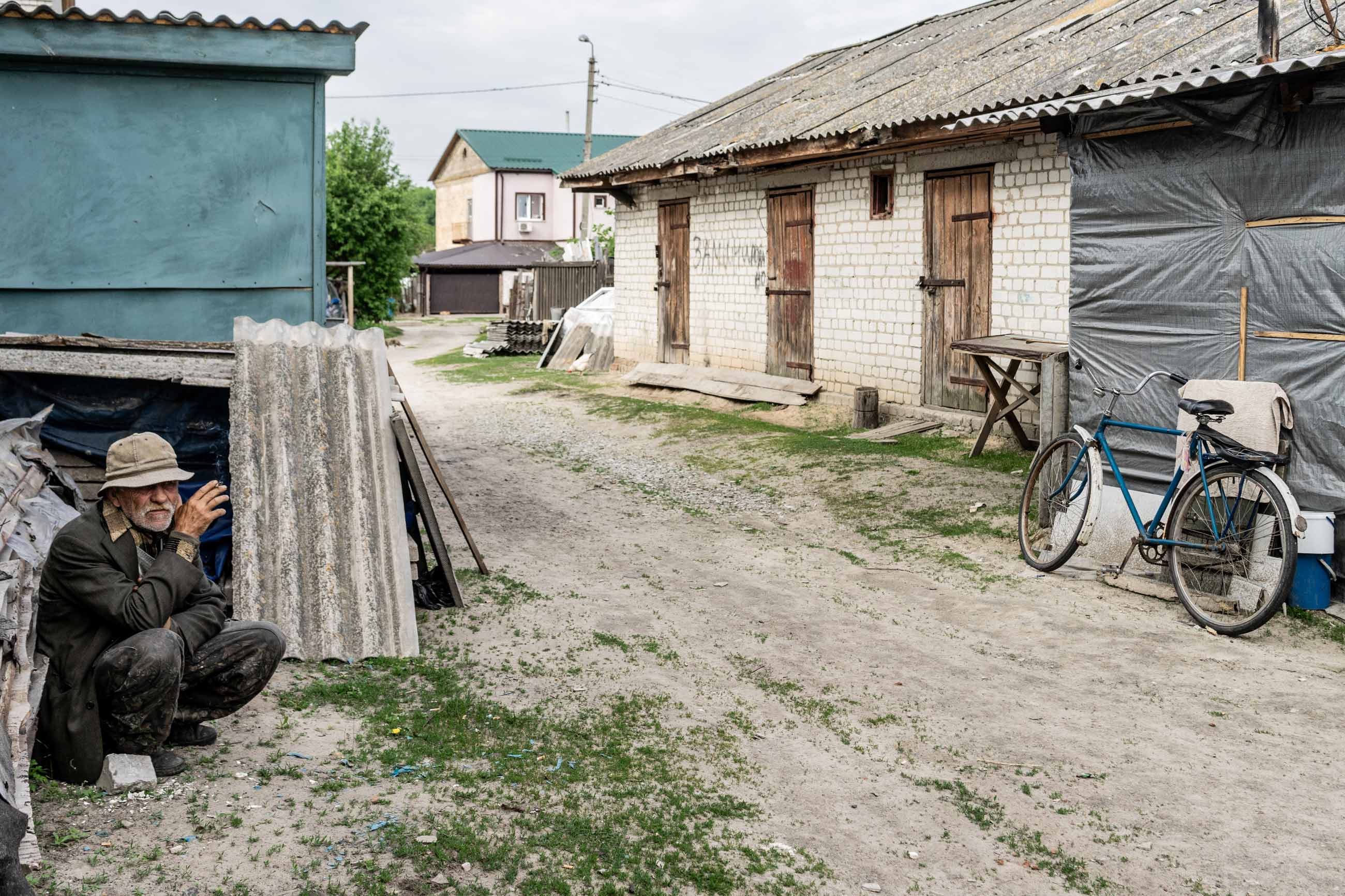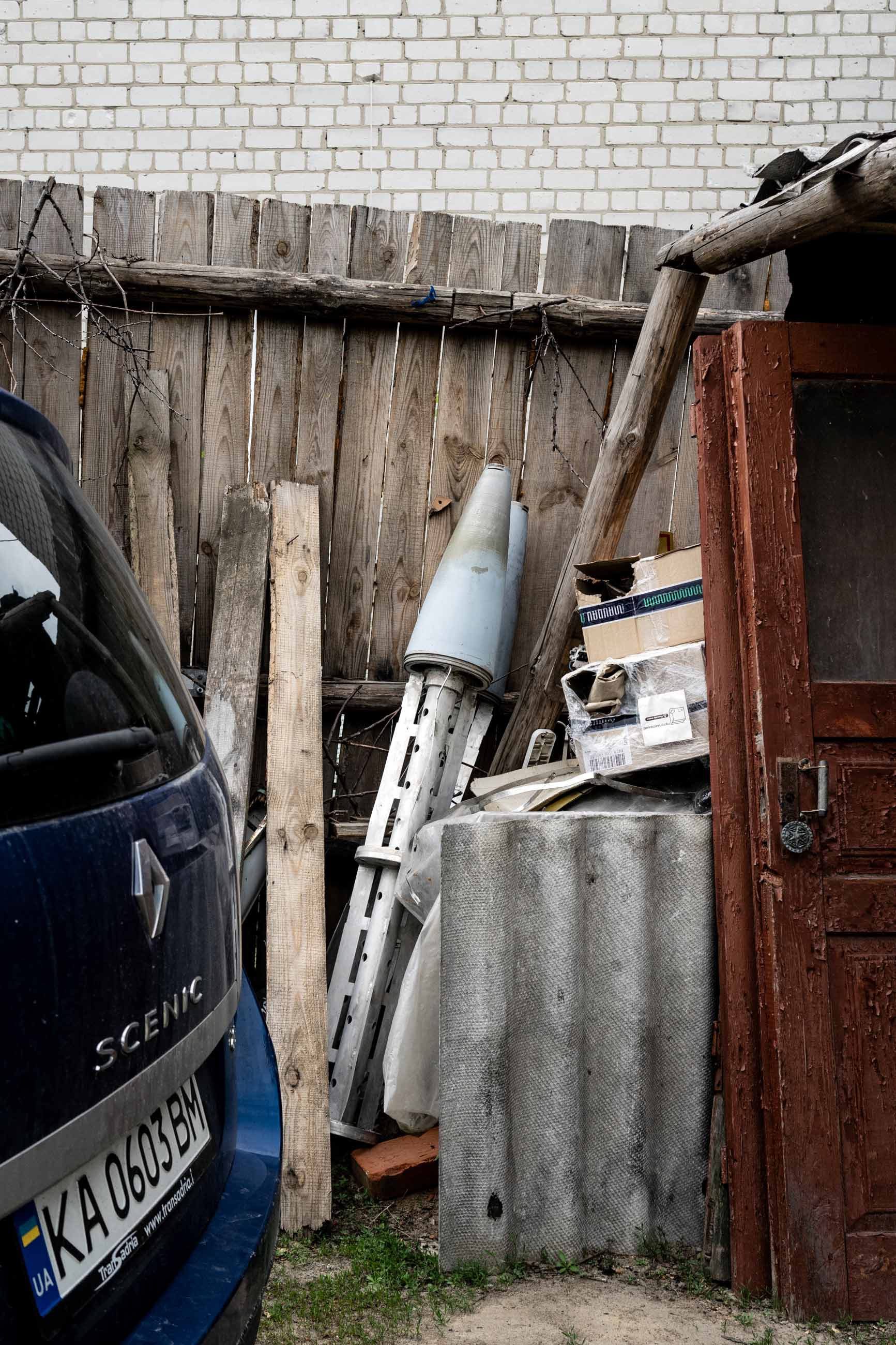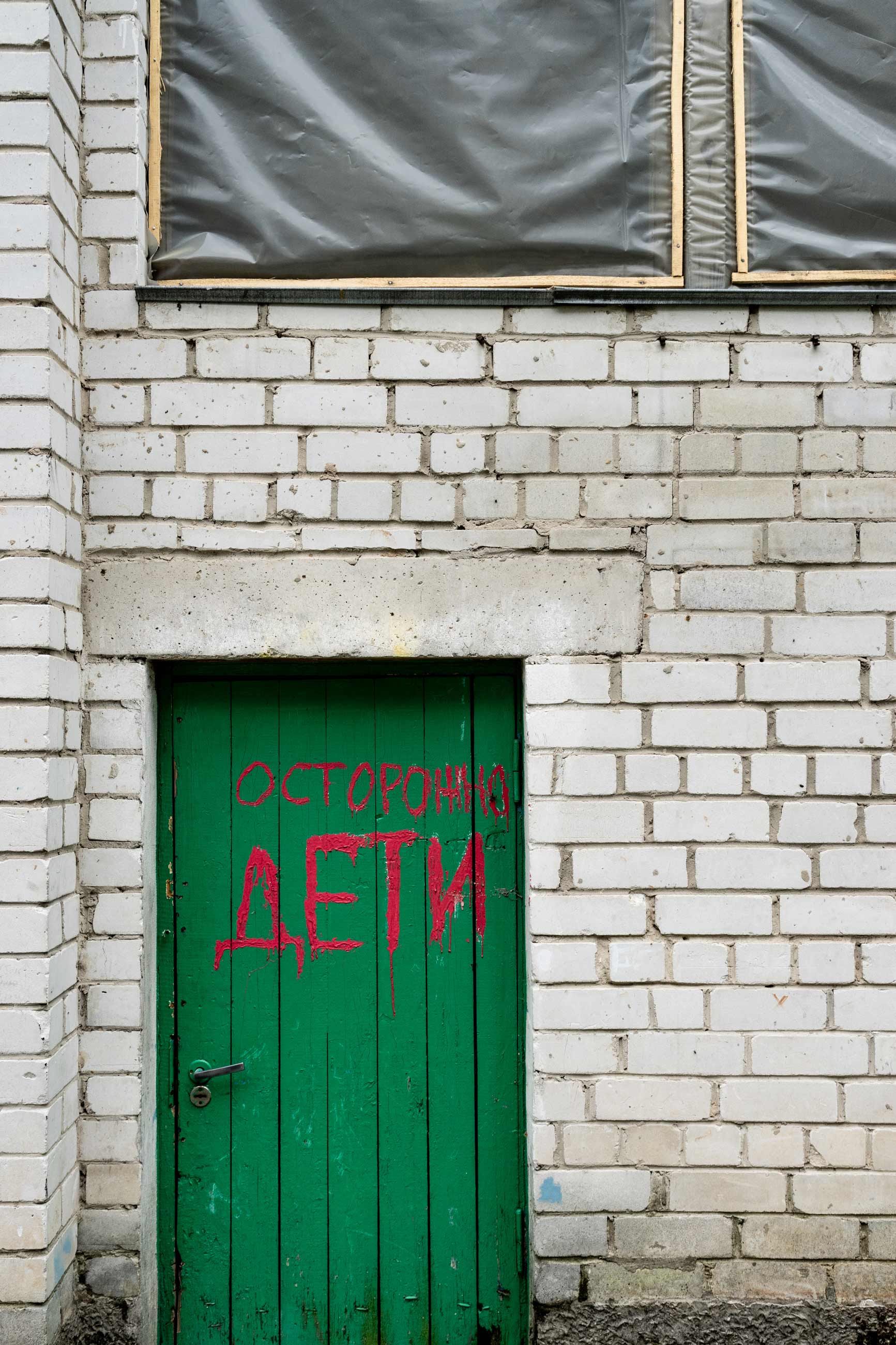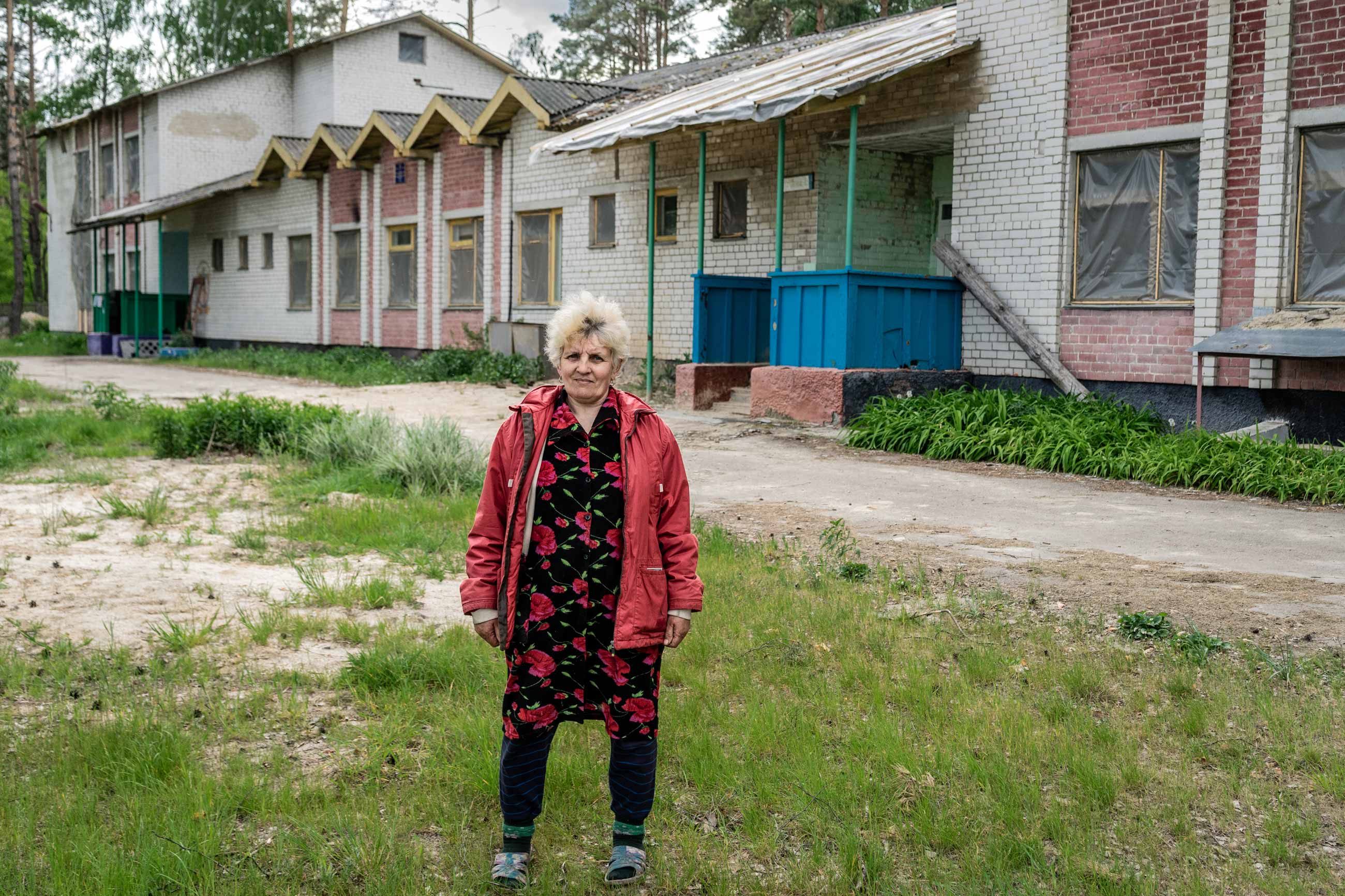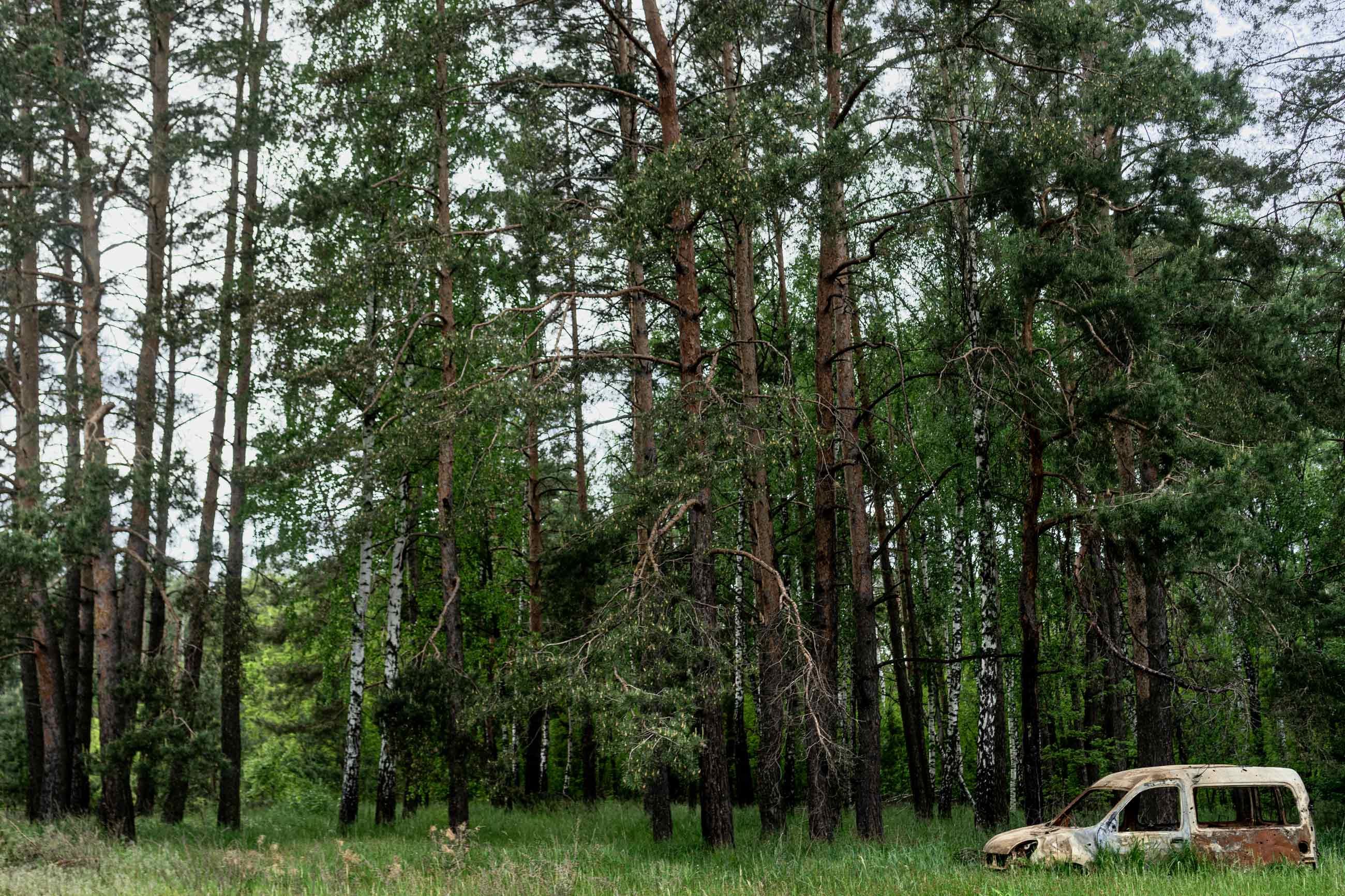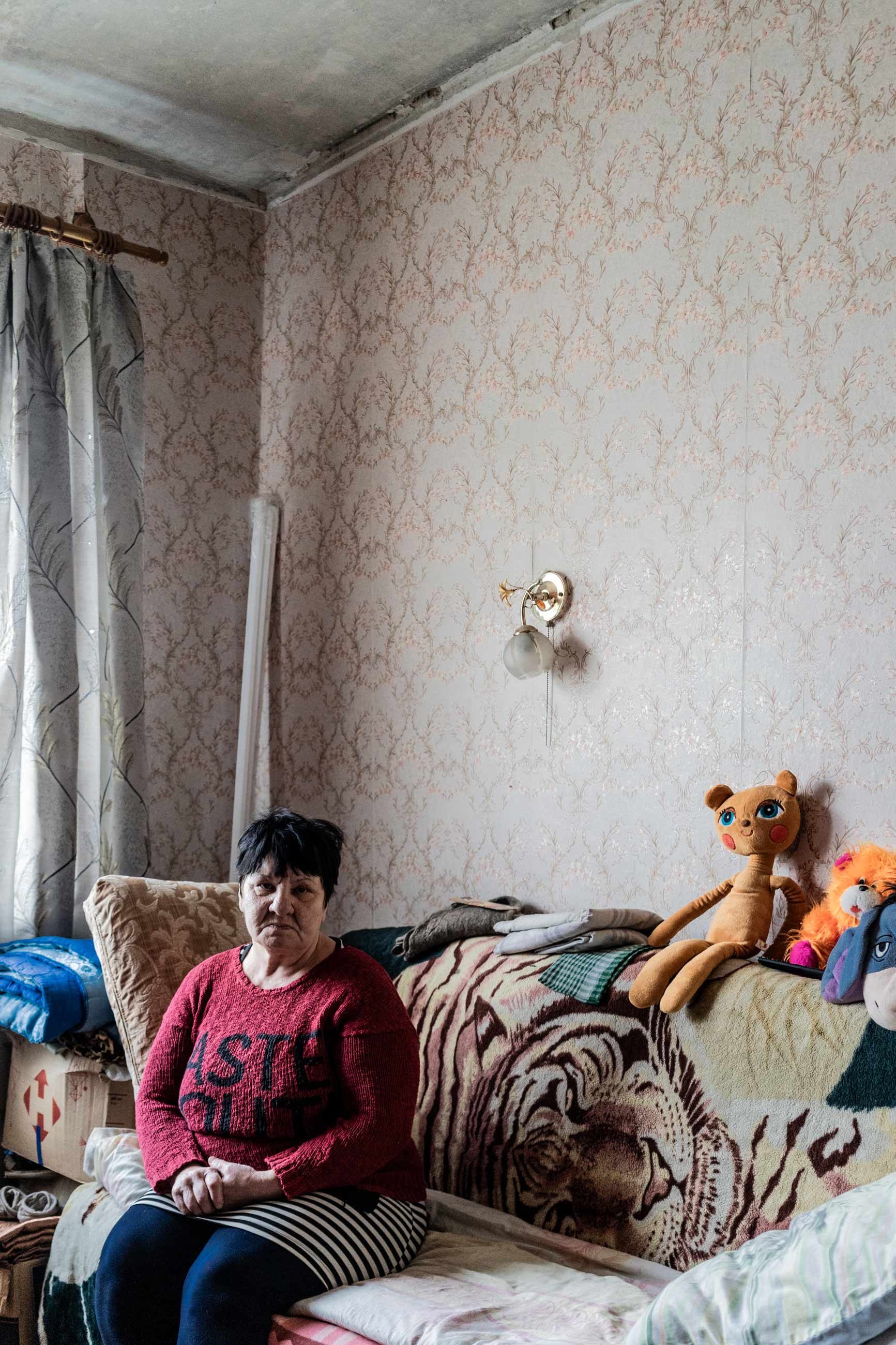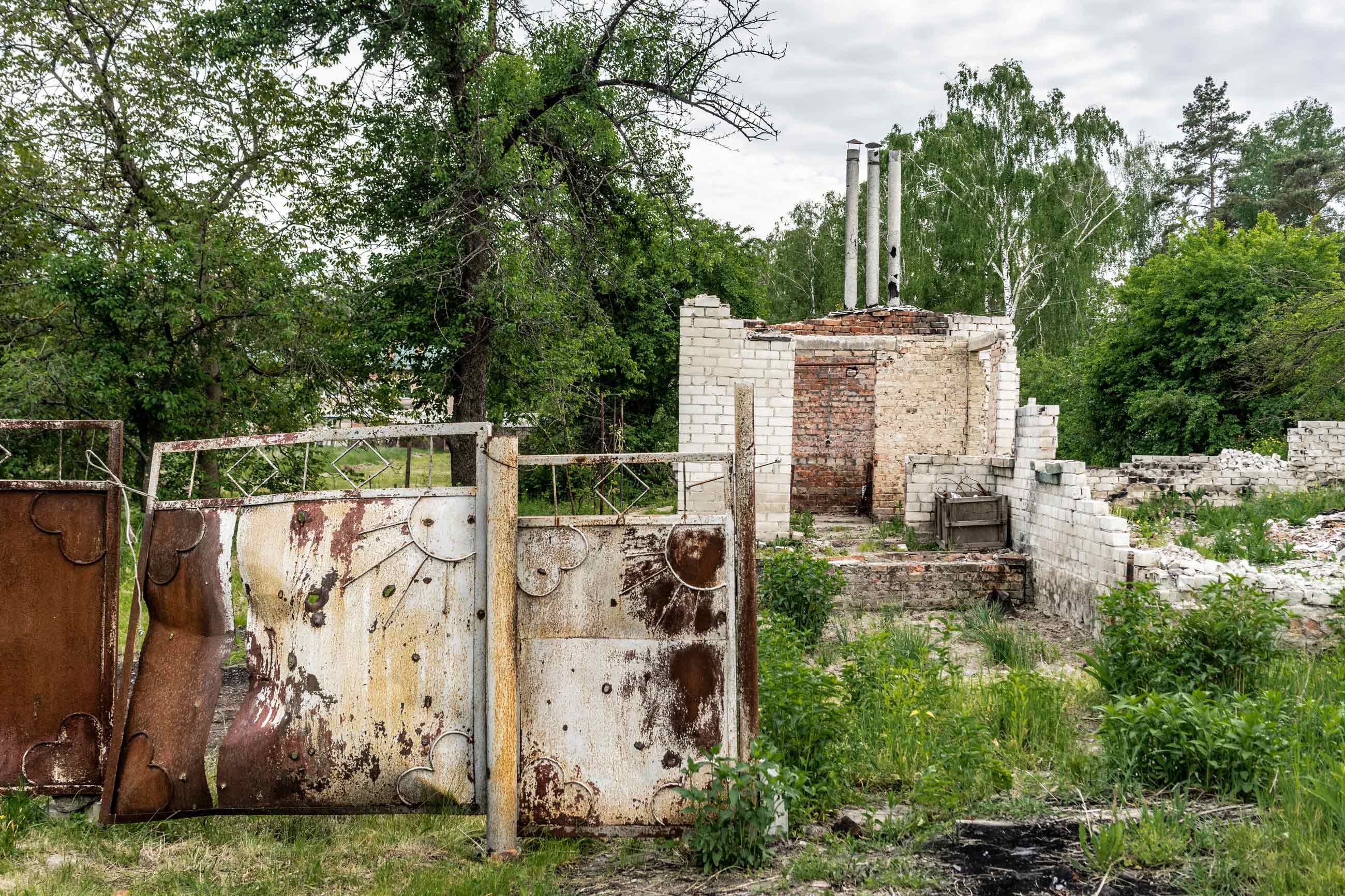For 27 days, Russian soldiers kept the residents of Yagidne village, located in the Chernihiv region, confined in the school’s basement. During this time, 386 people endured darkness, minimal food and water, and a lack of medicine until the village was liberated in March 2022. A year later, journalist Polina Vernyhor from Zaborona visited Yagidne and now shares the story of the village’s imprisonment and the war crimes committed by the Russian Armed Forces.
Have time to rebuild the village before winter
Yagidne is located 22 kilometers from Chernihiv. There are almost no people on Kosmonavtiv Street — the first Yagidne Street, where we turn from the Kyiv highway. Some houses are completely smashed, from others, the sounds of hammers and electric saws are heard. We go to the end of the street, where three builders are laying a foundation on the site of the ruins. They never talk about their work and what happened at home. One of them quickly says: “We have to finish it before winter, time is running out.”
Across from the house, there is a burnt-out car. The forest starts just beyond it. Along the roadside, there are signs with the inscription ‘Caution! Mines.’ We park our car and proceed on foot along a path that runs alongside the forested area. In the distance, beyond the field, we can spot houses with damaged roofs, while trees line the edges. Remnants of burnt blankets and clothes sway from the branches.
A hundred meters away, we notice a wide, ruined two-story building. It resembles a school or a kindergarten. In its backyard, there are children’s swings and horizontal bars. It is the local House of Culture.
Another, already new playground is installed in front of it. Fragments of shells lie in the grass around it, on which beetles and ants are crawling. A ten-year-old girl is sitting on a swing. In a few minutes, her mother comes to the playground. The woman does not want to talk about the occupation: “We are trying to forget it.”

The House of Culture in the village of Yagidne, destroyed by Russian shelling. Photo: Ivan Chernichkin / Zaborona
Basement to hell
Druzhba Street stretches from the House of Culture. There are mostly two-story apartment buildings on it. We enter the very first yard, two ladies are sitting on a bench.
One of them is called Kateryna, she is 62 years old. She seemed to be waiting for an opportunity to speak. As soon as he sees the camera, he immediately leads to show her tomb. It is a long one-story building with several doors and recesses underground. On the door is written “Mines” in chalk in Russian. It was in this basement that Kateryna and her husband hid at the beginning of the full-scale invasion.
“The first days, we were heavily shelled. We were all hiding in cellars. On the evening of March 2, a neighbor said that orcs were in Yagidne. I went outside to feed the cattle, and there was shooting: bullets whistling, shells exploding. I squatted down to the barn and looked through the gate – and there were already a lot of soldiers on the parallel street. There were definitely several thousand,” recalls Kateryna.
No one managed to sleep that night in the cellar. In the morning, the Russians were already going from house to house and taking people away. Three invaders entered Kateryna’s shed. Before that, one of them shouted: “Is there anyone? If you don’t leave, I’ll throw a grenade.”
Kateryna and her husband managed to take a package with documents, half a loaf of bread, half a bottle of water, and some apples. Scattered corn and shot chickens were laying in the yard.

The shed in which Kateryna and her husband hid for the first days. Photo: Ivan Chernichkin / Zaborona
Leading: two in front, one behind, all with loaded assault rifles. I see they are returning to school, and a lot of our people are already standing there. I thought, at the time, everyone would be put to the fence and shot. We were forced inside [the basement], propped up with a concrete slab. They didn’t release us for two days. We, as a whole village, sat in a damp basement — no light, no gas. There were about 380 of us, 72 children, and there were also people lying down,” the woman says.

The remains of a rocket projectile in the yard of Ms. Kateryna’s house. Photo: Ivan Chernichkin / Zaborona 
The entrance to the basement of the school in Yagidne, where the Russian occupiers kept the villagers. Photo: Ivan Chernichkin / Zaborona
27 days of darkness
For the first two days, the occupiers did not feed or give water to the hostages — everyone shared the crumbs they had taken with them. Then the Russian soldiers brought half a plastic cup of broth. Later, they threw us bags of dry rations. When the villagers illuminated the inscriptions with a candle, it turned out that the expiration date had expired in 2017. We had to eat what we had.
There were buckets in the basement — they used to go to the toilet there. Sometimes five prisoners were taken to the toilet in the yard, but they allocated very little time for this. People in the basement began to get sick from low-quality products, lack of food, poor sanitary conditions, suffocation, and dampness. There was no medicine, and 12 people died.
According to various reports, the Russians shot between 10 to 17 more people. And even though these estimates differ, everyone is aware of at least one victim in Yagidne: the body of a pensioner, a former policeman, lay on the street under the fence for three weeks. Some bodies were brought to the school and stacked near the basement. When seven corpses had been collected, the prisoners were finally allowed to bury the deceased.
“There was no transport, so the boys carried the corpses to the graves in wheelbarrows. They dug a trench so as not to bury one at a time. The Russians caught up, started shooting [into the air or the ground],” says Kateryna.

Kateryna in the background of the school in Yagidne, in the basement of which she and other residents of the village spent 28 days of Russian occupation. Photo: Ivan Chernichkin / Zaborona
One day, the occupiers announced their plan to relocate the villagers to the Tyumen region: the men would be tasked with cutting down the forest, while the women would be responsible for cleaning the fish. On multiple occasions, they attempted to take young girls from the basement, as some intoxicated soldiers sought to “have fun.” However, the residents managed to resist, and there is no evidence of rape occurring in the basement.
Freedom and grenades in the closet
Yaghidne was liberated on March 30th. In the morning, there was talk among the villagers about the occupiers’ prolonged absence from the basement. The sounds of armored vehicles moving could be heard from above. Around 3:00 p.m., everything fell silent. In the evening, the villagers dared to push the stove aside and saw there was no one outside. They did not dare to go out for the rest of the night because they were afraid that the Russians were in the forest: they were waiting for them to come out to shoot them.
“I said, ‘We will not go home, we will stay here. If they escaped, they will not leave this place so easily.’ It turned out that they left six sappers who laid mines and planted these surprises in our houses. They even set up a table outside the school — there was a rag and a grenade under it,” Kateryna recalls.
The next morning, the Ukrainian military arrived in Yagidne. Only then did the villagers dare to venture outside. Residents discovered grenades rigged as booby traps in their houses: in closets, washing machines, and under beds. Some people opted to stay at the school for a few more days until the minesweeper cleared all the houses.
It was only after the liberation that the villagers learned the Russians had failed to capture Chernihiv and Kyiv. They had been assured that the entire Ukraine would fall under Russian control.

A burned civilian car on the outskirts of the village of Yagidne. Photo: Ivan Chernichkin / Zaborona
A shot TV
Kateryna’s apartment, like her neighbors, is in a terrible state: due to the shelling, there were no windows, the batteries burst, and there are traces of bullets and shell fragments everywhere — in April 2022, it was warmer outside than in the house. The Russians shot personal belongings and killed all livestock. Kateryna’s cow, Yasenia, was shot by the invaders near the school. Her dog, Cartoon, sat next to the lifeless body for 27 days.
Later, volunteers came to Yagidne. At first, they brought products, and then they started rebuilding houses.
Kateryna’s neighbor, Nina, is 60 years old, she is also retired. At first, the woman worries that she looks “not for the shot,” but during the conversation, she relaxes and invites us to see her apartment, which she is still putting in the order.

Nina in her apartment in the village of Yagidne. Photo: Ivan Chernichkin / Zaborona
Last summer, Dobrobat rebuilt the wall, balconies, and roof and installed new windows in the house. Inside, there are still traces of the war: walls and wooden cabinets damaged by debris, and a shot TV. The occupants lived in Nina’s apartment. The Russians ransacked everything here and stole many personal belongings.
I have two sons, so they put on their sneakers and left everything behind,” says Nina. “There are still two granddaughters, both 10 years old, so they took jackets, shoes, and children’s clothes. They even destroyed the photos from our war album — they scattered them and shot at them with a machine gun. The TV is also damaged, but miraculously it still works. It may be broken, but, thank God, it works, and we can at least watch some news.”
Nina hopes that one day she will hear from this damaged TV that the war is over.

A house destroyed by Russian shelling in the village of Yagidne. Photo: Ivan Chernichkin / Zaborona

